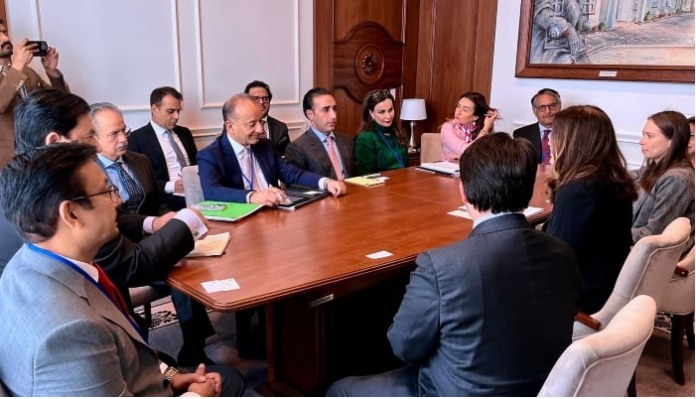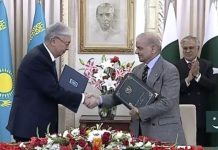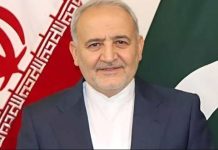ISLAMABAD, JUNE 3 (DNA):Pakistan’s parliamentary delegation led by Pakistan Peoples Party (PPP) Chairman Bilawal Bhutto Zardari has apprised the United States that South Asia cannot afford perpetual conflict.
The delegation said this during meeting with Ambassador Dorothy Shea, acting US permanent representative to the UN.
The former foreign minister, along with a nine-member high-level parliamentary delegation, is currently in New York, US, on a two-day visit to present Pakistan’s stance on the recent military confrontation with India and to challenge New Delhi’s narrative at the international level.
During the meeting, the group underscored Pakistan’s longstanding partnership with the US, including robust cooperation on counterterrorism and shared efforts for regional stability.
Bilawal appreciated President Donald Trump and his team’s role in facilitating the ceasefire between Pakistan and India, two nuclear-armed states.
He also reaffirmed Pakistan’s sustained commitment to peace, and its demonstrated capacity to respond decisively to aggression in defence of its sovereignty.
The delegation emphasised the importance of preserving the Indus Water Treaty (IWT), preventing the weaponisation of water, and maintaining a durable ceasefire.
“South Asia cannot afford perpetual conflict. Sustainable peace requires dialogue, especially on Jammu & Kashmir, which remains on the UN’s unfinished agenda, and collective efforts to counter terrorism. We must not let the region’s future be held hostage by confrontation. Diplomacy and cooperation are the only path forward,” the Pakistani delegation said.
Meanwhile, the parliamentary delegation met the Organisation of Islamic Cooperation (OIC) Group of Ambassadors as well and briefed it about regional situation in South Asia.
The delegation alerted the OIC Group to rising Islamophobia in India, ongoing repression in Indian Illegally Occupied Jammu and Kashmir (IIOJK), disinformation campaigns, and attempts to undermine the legitimate struggle of the Kashmiri people for self-determination.
“The Muslim Ummah must remain united in rejecting such narratives and standing firm for justice,” it maintained.
Implications of India’s aggression
Bilawal apprised the OIC Group at UN in New York on the grave implications of India’s aggression, including its reckless move to hold the IWT in abeyance, undermining regional stability.
He thanked the OIC for its principled and consistent support to Pakistan, and urged continued collective efforts to safeguard peace and security in South Asia.
The PPP chairman stressed that durable peace is impossible without a just resolution of the Jammu and Kashmir dispute, in line with UN Security Council resolutions and wishes of the Kashmiri people. He also appreciated consistent OIC support in this regard.
On the other hand, Pakistan and China have emphasised that aggressive posturing and unilateral actions must be firmly opposed, as they threaten peace in the region.
This came during meeting of Pakistan’s high-level parliamentary delegation led by Bilawal with Permanent Representative of China to the United Nations, Ambassador Fu Cong in New York.
The two sides called for advancing peace with responsibility in South Asia through multilateral cooperation.
They expressed the shared commitment to peaceful resolution of disputes, multilateral cooperation, upholding the principles of UN Charter, preserving the sanctity of treaties and respecting the international law.
The meeting discussed evolving security situation in South Asia in the wake of India’s recent aggression and Pakistan’s consistent efforts to uphold peace and stability.
During the meeting, Bilawal expressed heartfelt gratitude on behalf of people of Pakistan to China for its unequivocal support during Indian provocation.
He apprised the Chinese side of the developments following the Pahalgam attack and Pakistan’s responsible and restrained conduct in response to India’s belligerent posture.
Bilawal highlighted how India rejected Pakistan’s offer of credible, impartial and independent investigations.
He reiterated the centrality of resolving the Jammu and Kashmir dispute for sustainable peace in South Asia, and urged China to play its role in resolution of Kashmir dispute in accordance with the UN Resolutions.
He emphasised the need for the international community to transition from conflict management to conflict resolution for lasting peace in South Asia.
The Pakistani delegation shared details of India’s attacks on Pakistani territory, its deliberate targeting of civilians, its active involvement in funding and supporting terrorism in Pakistan, and the provocative decision to suspend the Indus Waters Treaty in blatant violation of international law.
UNSC briefed
Meanwhile, Pakistan’s visiting delegation also met representatives of UN Security Council’s elected member states in New York to expose Indian propaganda.
The delegation shared Pakistan’s position with representatives of Denmark, Greece, Panama, Somalia, Algeria, Guyana, Japan, South Korea, Sierra Leone and Slovenia.
The delegation underscored Pakistan’s commitment to restraint, revival of the IWT, and initiation of a comprehensive dialogue to address outstanding issues with India, particularly the Jammu and Kashmir dispute.
It briefed the UNSC elected members that holding IWT in abeyance may lead to water shortage, food crisis and environmental disaster in Pakistan.
The delegation called on the members of the Security Council to move beyond conflict management and actively support conflict resolution in South Asia.
Delegation head Bilawal refuted baseless Indian allegations with substantiated arguments.
He categorically stated that India’s baseless and premature allegations against Pakistan, were made in the absence of any credible investigation or verifiable evidence.
Bilawal highlighted that India’s reckless actions including targeting of innocent civilians and suspension of IWT is a threat to regional peace.
He highlighted that Pakistan’s response to Indian aggression was measured, responsible and in accordance with the UN Charter.
The elected members of UN Security Council appreciated Pakistan’s outreach and welcomed its reaffirmation of commitment to peace and diplomacy.
They noted the significance of de-escalation, respect for international law, and the peaceful settlement of disputes emphasized that the UN Charter must guide state conduct, particularly in regions of high sensitivity such as South Asia.
They acknowledged the risks posed by any further escalation and stressed the need to pursue diplomatic solutions.
Separately, the parliamentary delegation met with UNSC President Ambassador Carolyn Rodrigues-Birkett. The delegation underscored that sustainable peace in South Asia hinges on the resolution of the Jammu & Kashmir dispute in line with UNSC resolutions.
“The time has come to move from conflict management to conflict resolution,” it added.
The Pakistani representatives also raised Pakistan’s deep concern over India’s illegal violations of the IWT, an alarming act of weaponising water that threatens regional stability and the rights of 240 million Pakistanis. They urged the UNSC to uphold international law and its own mandate.
The Pakistani group also met with the Permanent Representative of the Russian Federation to the UN to convey Pakistan’s principled stance in the wake of India’s unprovoked aggression. They highlighted Pakistan’s responsible and measured approach, and underscored the imperative of a lasting ceasefire, besides drawing attention to India’s dangerous weaponisation of water.
Urging Russia to support efforts for regional stability and a rules-based international order anchored in the UN Charter, they reiterated the call for comprehensive dialogue to resolve the Jammu & Kashmir dispute in accordance with UNSC resolutions.
It should be noted that India had sent seven multi-party delegations to 33 countries as part of India’s diplomatic outreach. Aim of the delegations was to portray Pakistan as a supporter of terrorist organisations and defend launching of India’s Operation Sindoor into Pakistani territory, which claimed lives of innocent civilians.
From May 6 to 10, the armed forces of Pakistan and India fought against each other. The conflict was triggered by New Delhi after an attack in Indian Illegally Occupied Jammu and Kashmir’s Pahalgam on April 22, where gunmen killed 26 civilians. India labelled it an act of terrorism orchestrated by Pakistan, a claim denied by leaders in Islamabad.

















